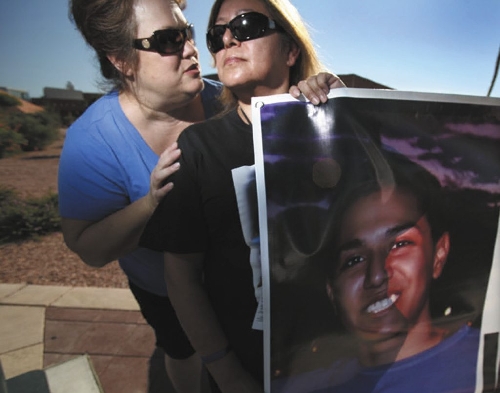County officials agree to move ahead with coroner’s inquests
Alma Chavez wants answers.
Less than three weeks after her 23-year-old son was shot and killed by police, Chavez implored Clark County commissioners Tuesday to move forward with coroner's inquests, the hearings into fatal police shootings and in-custody deaths, so that she can find out what happened the day he died.
"When the police arrived, in less than a minute they decided my son deserved to die," Chavez told the commission in recounting the July 14 confrontation that left Rafael "Ralfy" Olivas dead.
In the gallery behind her, about 20 people wore matching white T-shirts with a photo of Olivas and the words "Keep On" printed on the front and "Push us one step back we'll take two forward" printed on the back.
"Help me, please, to find the truth," Chavez said to applause.
The commission later obliged, directing Coroner Michael Murphy to start scheduling inquests despite a lawsuit by police officers challenging the constitutionality of inquests.
"At some point, I think, we're going to have to move forward," said Commissioner Steve Sisolak, who put the issue on the meeting agenda in hopes of addressing a growing inquest backlog.
The county's move sets the stage for a legal challenge by the state's largest police union, the Las Vegas Police Protective Association, which has led the fight against the revamped inquest process and backed the lawsuit that put inquests on hold.
Union head Chris Collins said the union's lawyers were reviewing the commission's decision.
He stopped short of promising another lawsuit to block future inquests, however, saying, "We'll take whatever action we have to take on behalf of those officers."
The county hasn't held an inquest since October, creating a backlog of 14 cases. Most of the delay came while the county studied and changed the inquest process, which had been criticized as being too favorable to police.
The key change was the addition of an ombudsman to represent the family of the person killed. The ombudsman works with the family throughout the inquest preparation and can directly question witnesses during the hearing.
The first inquest under the new system was scheduled for last month, but it was postponed when the three Las Vegas police officers facing the inquest filed a lawsuit challenging the constitutionality of the inquests.
The officers contend the addition of an ombudsman transformed the fact-finding hearing into an adversarial one and violated their constitutional rights to due process.
That case sits in federal court, and a resolution isn't expected for at least six months.
"It's unfortunate that the police union can hold hostage 13 families who are just looking for the truth," said Lisa Mayo, a critic of the old inquest system, who approved of the commission's move.
During public comments at Tuesday's meeting, several people urged the commission to move forward with the new system.
"These families deserve to know," activist Gina Greisen said.
Chavez said that without the inquest, police had a "license to kill."
Las Vegas police shot and killed her son last month after he approached them with a knife in the street near his home, police said. Chavez had called 911 during an escalating argument with her distraught son, who had been fighting with his girlfriend.
"If the police have nothing to hide, why are they afraid of this process?" Chavez said during comments that were peppered with applause from the gallery.
The applause was replaced by boos and jeers when police union lawyer John Dean Harper took the microphone. He said he hadn't planned to speak but couldn't sit silently while some people called police murderers.
"Contrary to popular belief, officers do not wake up in the morning intending to hurt, kill or shoot someone," he said .
Several hours later, the commission took action after a brief discussion to clarify that the police lawsuit applied only to the first inquest. Commissioners directed Murphy to schedule the next several inquests.
If the police file a lawsuit to stop the next inquest, "then we're back where we started," Sisolak said after the hearing. "It seems like we're just walking sideways."
However, it is possible that the next inquest could go on if the county doesn't agree to a postponement, which it did in the first case, and a judge allows the hearing to go forward, Sisolak said.
Commissioner Chris Giunchigliani said the commission moved ahead because it had passed the inquest changes but wasn't enforcing them.
"If we don't do anything because we think we might get sued, then shame on us," Giunchigliani said.
She wants to give the revamped inquest process a chance to work, but that can't happen until an inquest is held, she said, adding she remained "hopeful" that an inquest would materialize in the next few months.
"I hope at some point there's a resolution because this is not good for our community, and it's not good for the officers," she said.
Contact reporter Brian Haynes at bhaynes@ reviewjournal.com or 702-383-0281.

















